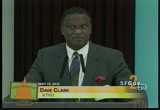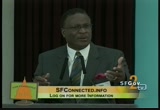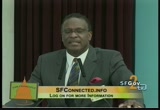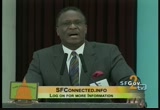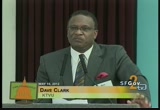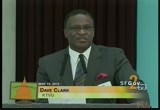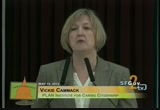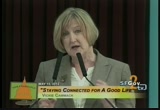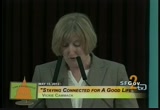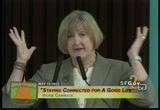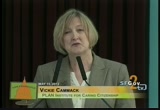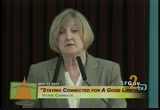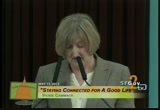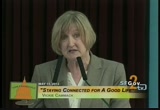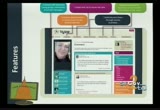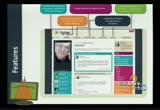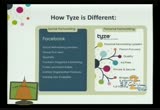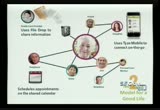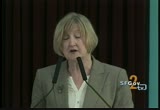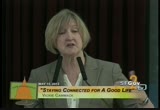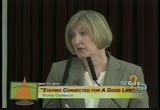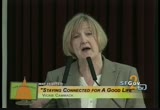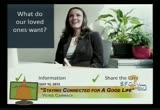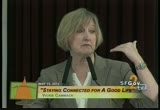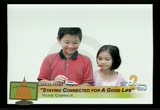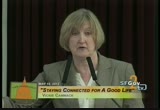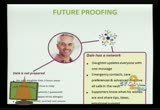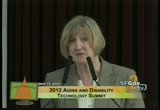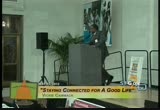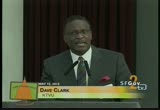tv [untitled] July 30, 2012 9:00pm-9:30pm PDT
9:00 pm
singer. my son doesn't speak. in 19 years, i have never once heard my son said, hi, dad. but he tells me he loves me every single day. i am so happy and fortunate that he is a great young man, and god uses a son that doesn't speak to teach me so many things all day every day. i rarely talk about that because if it hits to the core of may. and that is why i have learned the necessary needs of technology whto learn and to grw
9:01 pm
at to do things. and why you and i need the things you're going to hear in just a couple of minutes. i just want to take a quick moment as you get settled. you will have to stop talking because i will not talk over you. you, too. i'm going to count to ten. i usually don't have to finish to ten. when you think of technology in the world today, we can't even imagine what is going to have the month from now. think of the things that have been eaten up. we used to have payphones. they are gone. the cellphone 8 it up. the cellphone 8 of the camera industry.
9:02 pm
you don't need to buy a camera. the cellphone 8 the watch industry. i don't even wear a watch. you can go through the list. he you don't have to go to the bank anymore. take a picture of a check and make a deposit. look at all the things that we have changed. and change every day. if we can't imagine what is going to happen by christmas time. you don't even have to go to the pharmacy to say, fill this out. pick up a phone, punch in, go and get it. send your kids over. i know. simple point, simple, practical points. the things they you are living, it all in involves technology.
9:03 pm
am i saying hi to you and applauding you for all of the great things that you are about to do? i just congratulate you on credit and because you were going to learn it and you were going to do it. your kids are going to help you, your grandkids will help you. now there are two very important people. i would like to introduce them to you today. one is a very talented lady, her name is vicki. she is someone, and i will read some of this that you get an idea of who she is. she is a canadian, by the way. that rang a bell. but vicki finds and implement
9:04 pm
innovative solutions and the social sector. this is something called the planned lifetime advocacy network. the personal support networks. as the executive director of the institute for citizenship and disabilities, she became a recognized expert in canada. for developing social networks, social innovation, citizenship, and turning around the world of those that are disabled. she is the founder and ceo of of the personal network. she has been focusing her skills best to deliver personal networks,, she has done a
9:05 pm
tremendous amount of things. she has done so many things, i need a calculator to add them all up. the idea is that she is an expert on building personal networks and coming up with things that will work for you that will change your lives. give a warm welcome to vicki camack. [applause] >> good morning, everyone. what an amazing venue to hold this event, i have already seen a wedding here. i thought that only happened in movies. what an incredible city that you live in. the division of people who are
9:06 pm
putting something together where san francisco will be the most connected city in the world. the force behind what they are putting together, when they talk about connections for everyone, they really mean everyone. there are true inspiration for me, fellow canadians, and many of us around the world. the theme of my presentation today is about staying connected her. and if there are two things i am passionate about, it is that. those phrases really sum up the last 20 years of my life in so many ways. and so to explore the themes, what i want to do is share with you some ideas about
9:07 pm
consciously working on making and the sustaining connections. which is what i think we all need to do. to get started, we will talk a little bit about the technology solution. i want to share with you stories, lessons, and some new ideas. i want to have knowledge all of you that are here today thinking about trying something new. thinking about a new approach to technology, using technology differently. maybe it will be your first time in beijing with a computer. you might feel a little bit like a fish out of water. i really do understand. i am the very last person that anyone in my circle of friends and family would have ever thought would be heading up a tech company. i never thought i would either.
9:08 pm
i can tell you, it is a slippery slope once you get started on technology, so i thought i would take it a little easy and introduce you. maybe that wasn't the kind of mouse you are thinking about, how want to tell you a story. this is a mother mouse. she was walking down an alley with all of her about slayings of a lovely spring day. as she was walking down the winding road, out of the bushes comes a big cat. it charges its back and hisses, the mother mouse gathers her little children around her, and looks the cat in the eye and goes, ruff, ruff, ruff.
9:09 pm
the cat, stunned, turns and runs away. the mother bows looked down and says, let that be a lesson to you. never underestimate the power of the second language. [laughter] [applause] so as we begin to estimate some of these powers, what i would like you to do, for me, think about one part of the theme that we are exploring today, the good life. i would like you to take a moment and reflect on what would be a good life. what are the critical elements for you, of a good life? this is a question of philosophers have explored over
9:10 pm
the ages. time after time, this is what we like to explore with people facing disabilities and life challenges. i am curious, when you thought about what would be critical for a good life, how many of you listed family and friends? how about making a contribution or participating? being engaged? how about good health and having choices? all of these are core elements. you know how most of our efforts are focused? yes, this is it. this is how we have a whole industry thinking about future planning and what a good life is. it is focused on money.
9:11 pm
you can see some canadian money up there. in any case, i am curious about how come how money is easy to plan for, and but what about planning for people? what about those loved ones, those friends that we all say are so critical for having a good life? how many of you, when you thought about a good life, put friends and family first? how many put friends and family being the critical number one element? what do you think it is? what makes it easy to think about planning for money? but so difficult to plan for people? there is something that makes us
9:12 pm
hesitant to reach out to others. some of us can take this idea of independence to an extreme. i think this is probably some place in newfoundland, a remote shore of canada. we have come to believe that reaching out to others is a sign of weakness. was he asking for help and support as a vulnerability instead of a necessary strength. so if you agree with me that connections are the key to a good life, i would like you to explore with me how technology, and in particular, how that works can actually help. i would like to tell you about ties in the online network service. that is installed on every b-top
9:13 pm
computer in san francisco. this knowledge built on 20 years of connections to secure the future. it creates personal, private, secure online networks. here is what happened personal network looks like. and joe and her daughter created a network together, and what they did, they created a network in part because guildhall has an advance in her experience with cancer, and they wanted to coordinate the care and the connections and bring people closer to her in this important time. they identified and who they wanted to invite, and that is
9:14 pm
the only way you can get on that network, if you get an invitation. she knows you and wants you to join her. and how they use the network is the use of the connect feature to send messages. her daughter can send messages to everybody in the network letting them know how she is doing. they used to the calendar to schedule appointments and organize rides. they use the shared tasks and goals to organize larger events. for example, when joe was released from the hospital, she was unable to get back into her home because she could not get up the stairs anymore. they used the network to build her a ramp on saturday afternoon. they use files to share information about her and a
9:15 pm
place where she keeps her personal information. she has advanced directives, medical records, and so on that is not accessible to everybody in the network, but some of the members. there are stories and photos, a place where people can celebrate today, how to share memories, have the good times that were the essence in the past and in the present. you might be asking yourself this question, if you are a facebook user, how is different from facebook. it is what we called open social networking, and it is designed to create many relationships. this is closed and personal, it is an intimate space.
9:16 pm
i have a daughter that was close to 1000 facebook friends. it has no advertisements. no data mining, it is private and secure. it bridges the formal and informal world of care and support. and what we have discovered is that people that use a, what they get out of that is what we call the network of fact. we have jill in the center of the network and you can see on the upper side where you have a health care provider to put information into her fault about her health care. if you have heard daughter using the mobile application to update people on the go. you have the neighbor that tax the schedule to see when he is going shopping -- this is an
9:17 pm
illustration of a network of fact or network model of the good life. the neighbor says, always check on line to see what joe needs. the physician's assistant says it is easy to share the test results. the personal care worker says i've posted on the loose handrail and they handled it right away. her sister says, i am part of a team now, what a relief. out of this idea of the network of fact, one is that this is what joe wants. this is her key to a good life. her network is actually her gateway to a good life and her ability to stay home.
9:18 pm
and we will launch a touch screen interface for those that want to connect through video. i want to share with you a few things that users are saying at telling us about their experience. 91% says that it helps them share information. that is the number one thing that people providing support to us want. 80% says that it strengthens connections. how can using something on-line actually make us feel closer or more connected to our friends and family? out it works, the more connected the leafy zero with the more information we have. if any of you have grandchildren living far away, if they know that you have recently been to the theater or play cards with friends or had a
9:19 pm
family dinner, they feel more connected to you and telling the you have been to the doctor and all of those things. this is the way that technology can help people) distant connect with us. 75% of our users say that we work with others to provide care and support. today, ties is three years old, and we have learned a lot about lessons with the good life. our number-one lesson is that no one should have to face thelma's, disability, or caregiving on their own. there are growing numbers -- why we did pay attention to this, constantly reaching out in creating our own networks, keeping them informed is one major reason, there are more and
9:20 pm
more of us living alone. 40% of people over 60 live alone. we are more vulnerable in terms of how we are living and we are more vulnerable because those of us are living with chronic and complex diseases. that can lead and capacity to it is a very positive thing to do. what we might think of as our desire is for the company and so on, our health is a social affair. our health is intimately tied with our connections and support. when we have a good network around us, we heal more quickly, we live longer. and when we are isolated, it impacts things like hospital rea admissions, the number of
9:21 pm
doctors' visits, the capacity to handle stress. what we want to really focus on in terms of the number-one lesson is that no one should have to face these things alone. and when we consciously reached out to create a network, we are better off. let's think about the people that want to be involved in our life. this is really our loved ones, sons, daughters, her friends. what do they want? since we are facing challenges, they want information that they want to share and care. they definitely want to be involved. there is no question that our family members and friends want to be involved. and some of the challenges that
9:22 pm
they are facing is that many of the people that might be providing care for us are working. the number of working care givers has tripled in the last 15 years. and what they need to be able to share is to be able to share the care. the caregivers, the people that love us, our sons and daughters and family members, if they are caring for us alone, their health deteriorates. they often have to leave their jobs and take a reduction in tom. -- in income. and how important this is in terms of our thinking about the future and creating a connected network is that fully, for 80% of people that live in their own home and receiving care, this is not by the way, what most of us
9:23 pm
want. to live and stay in our homes and in our own space. but for people that received in home support of some kind, and they would not be able to remain in their home without the involvement of friends and family. the critical reason to be thinking about what our loved ones want. they want to be engaged and our job is to support them to do that. what about the young ones? what does the future want? not just the young ones, but all the people cheering for us in the future want to use technology. 77 percent said it will save them time, 74% believe it will relieve stress. and there is a generation coming up that will expect to be kept
9:24 pm
informed and make connections on line. my nephew just sent me a video from vancouver having a skype conversation with his cousins in england. and as our last lesson, we want to help each other. i want to reinforce this. a part of the reluctance is this fear that people are going to say no. the recent community vitality report says that three-quarters of us extend to a family, friends, and neighbors. this man's name is charles, 86 years old. he has an early stage of dementia. he starts the network, he invites the sisters. why in sydney and one in singapore. he also invites the neighbors.
9:25 pm
they refer to it as the neighbor lady. she says, thank goodness that you ask. i have been worried about charles. and creating that meaningful exchange. let me share a new idea or a new term that i am using thinking about this idea of staying connected and having a good life. this is an idea that i am calling -- this is a little picture of dale, somebody that has a f and hisuture -- that has done his future-proofing.
9:26 pm
this is what has happened to him when he went into the hospital. his daughter of everyone with one message. there was emergency contact, care preferences hall facing the vault so that the care providers know what to do. and the supporters know what his wishes are and they can share tips and ideas and emotional support to him. dale is future-proofed. pieces of this idea staying connected to a good life is about having some peace of mind as we think about the future. i encourage you all about what makes a good life for you. i encourage you to reach out to others to make it happen. it won't happen in isolation, there is no independence without
9:27 pm
tinterdependence. when we reach out to others, everyone benefits. reaching out and making connections for a good life provide peace of mind for you, but for every one that loves you as well. if there is one final message i would like to leave you with, it is that we are, quite simply, better together. if any of you are interested in learning a little bit more and seeing a live demonstration, i will be over in the south court this afternoon and in the lunch break. i would be delighted to chat with you. in the meantime, thank you so much. [applause] >> oh, come on. give vicki camack a bigger hand
9:28 pm
than that. [applause] that's vicki. whoa. thank you, vicki. honestly, vicki, i like that ties network, just the idea of all the connections. a personal and isolated in formation, thank you very much. there is a gentleman i will bring up and get out of the way, i wanted to mention something about the news business and technology. hopefully you watched television. our business is changing by the day, we depend on technology. i would feel naked without my phone. i would feel naked without my ipad. even when i am on television, i am talking by e-mail with people just like you. if dave, do you know about this event? this is what is happening here
9:29 pm
at this time, often we get to do with it because we heard it straight from you. through e-mail. you might say, i don't have your e-mail address, how to live by you? you can go to our web site and you can find it there. our business has changed so much because of self bones. you are at the place where something is happening. if you without a phone and take a picture, with your permission, you get there before we get there. there was a big crash write in the heart of the financial district. we heard about it, but there was so much traffic, we could not get there. my colleague said that if anybody can see this, take a picture and send it to us.
53 Views
IN COLLECTIONS
SFGTV2: San Francisco Government Television Television Archive
Television Archive  Television Archive News Search Service
Television Archive News Search Service 
Uploaded by TV Archive on

 Live Music Archive
Live Music Archive Librivox Free Audio
Librivox Free Audio Metropolitan Museum
Metropolitan Museum Cleveland Museum of Art
Cleveland Museum of Art Internet Arcade
Internet Arcade Console Living Room
Console Living Room Books to Borrow
Books to Borrow Open Library
Open Library TV News
TV News Understanding 9/11
Understanding 9/11